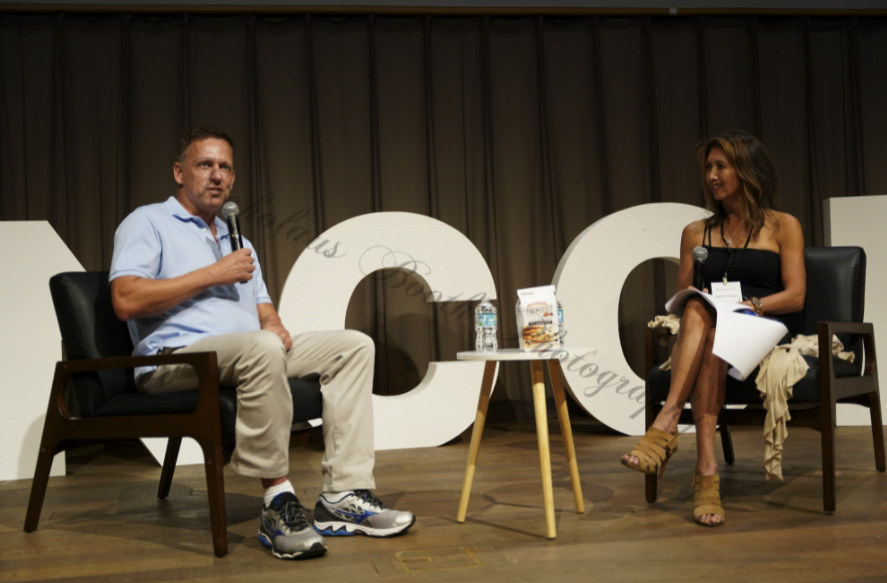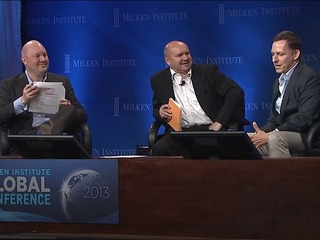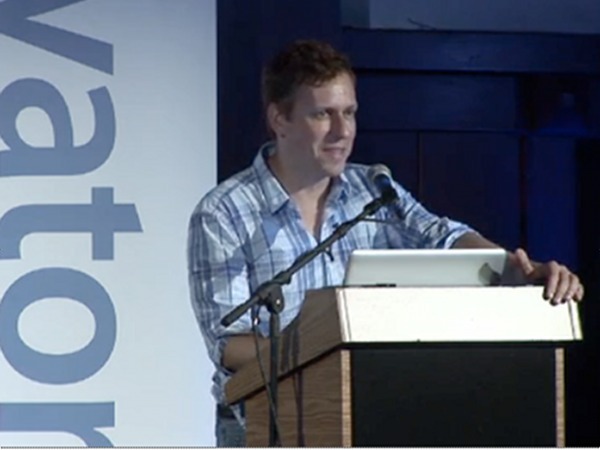
Love him or loath him, Peter Thiel is one of the most prominent and influential voices in technology and politics right now. When he talks, people listen. But he doesn’t often speak on the topic of religion in front of a mostly tech crowd. In an uncommon and rare interview, Thiel talks about his faith and how this influences his culture and politics.
Last week, he sat down with Vator CEO Bambi Francisco Roizen at the Culture, Religion, and Technology Miami event, hosted by Lincoln Network, a non-profit centrist group bridging tech and policy to build tech that advances freedom. Paul Martino, partner at Bullpen, introduced the conversation well by saying: In order to understand Peter’s philosophy and the Thielists that now follow you can’t understand it until you understand that he’s a deeply Christian person. By having Bambi, who’s written a book about a modern-day mixed marriage, and who is also deeply Christian, you’ll hear something very different.
Bambi then kicked off the conversation by describing how religion is downstream from culture, which shapes our social contracts (yokes) and how technology can reorder our social orders and systems.
“Our Judeo-Christian foundation is what underlies our culture, our morality, and if we want to steward this country well, we have to understand the lineage of our beliefs. But, unfortunately, society has become desensitized, and sometimes hostile, to our spiritual heritage. And a lot of that is due to our quest and our craving for rational, and scientific, explanations for our beliefs. That’s had profound impacts on our culture, whether it’s how we understand the human condition to how we define our identity to how we define our relationships with one another,” Francisco said in her intro.
In her book “Unequally Yoked,” Francisco’s central metaphor for social contracts are “yokes,” or wooden crosspieces that are fastened over the necks of two animals and attached to a cart that they have to pull. Those “yokes” include: man to society, parent to child, teacher to student, manager to worker.
“All of these yokes are beautiful gifts that bring us together in this combined and unified journey, to build something greater than ourselves. Our identity is more relational than we know,” she said.
“But these yokes, for so many people these days, are starting to feel like burdens.”
Thiel and Roizen a wide ranging interview that covered how current views on spirituality and faith are affecting everything from democracy, freedom, woke culture, to education.
It is timely given the many news posts about Thiel’s influence on American politics and the Republican party. In fact, the New Yorker asked in a 2021 article: “Has the Republican Party found its post-Trump ideology?” If Thiel represents the new GOP party, it’s good to understand where he puts his identity. Go to the very end of the video and you’ll hear him state his identity is in Christ. “Christianity for me is the anti-identity. Your identity is in Christ… and it’s in that context we can figure out things about the world and truth… [Truth] is not a social construct.”
Here are some of Thiel’s quotes from the talk:
On freedom
“Freedom has many different dimensions. There’s an annoying regulatory version, that’s somehow been hit home really hard with all the insanity of the last 20 months with COVID. There’s freedom from excessive taxation, which I’m really into. And, of course, you have freedom of speech, freedom of religion, you have the right to remain silent and not to answers questions from everyone in the media, yourself excepted. So, there are all those of different dimensions of freedom one could talk about,” Thiel said.
He mentioned that the one freedom he keeps circling back to, even though he noted that he was “not sure it’s the most important,” is freedom of thought.
“I never liked the word ‘contrarian’ because that just sounds like you’re attaching a negative minus sign to what everybody else thinks, but it’s really the freedom to think for yourself, the freedom for some kind of independent thought, and that feels under assault in an extreme way in California, the United States, the western world, and in many other places there’s even less than in America or in Florida,” he said.
“I’ve often thought that the biggest political problem we have is the problem of political correctness, the incredible homogenization, standardization, where everybody in society thinks the same way, is not allowed to think differently.”
It’s an odd juxtaposition with the Judeo-Christian history, he said, because, in the 17th or 18th century, the self-styled deists, or rational thinkers, were the anti-church people, and the church was considered excessively dogmatic, and now it’s the opposite: it’s Orthodox Christians who are “the most heterodox, independent thinkers left in this country.”
“In a democracy, we broadly think that 51% of the population is more right than wrong. And that if you get up to 70%, that’s even more accurate. But if you get to 99.99% agreement, you’re not in a democracy, you’re in North Korea.”
Technological innovation
Thiel expressed some hesitancy over just how impactful the internet really has been on society.
“The somewhat unfashionable view that I’ve articulated is that it seems to be that there isn’t as much progress happening as advertised. And that, rather than racing towards utopia or dystopia, the much bigger problem is one of relative stagnation. It manifests economically and, for the first time, we have a younger generation that’s not clearly doing better than their parents,” he said.
Thiel pointed to a tagline that his venture firm Founders Fund wrote a decade ago: “We were promised flying cars, and all we got was 140 characters,” though he noted that this was not an argument against Twitter itself as a company.
“The larger social, political question is, is this actually really transforming our society and taking it to the next level? Even though, obviously, the communications technologies culturally can be transformative, how much are they delivering economically? And is this really as dramatic a future as, say, going from the horse to the car or indoor plumbing? If you get a choice of getting rid of jet travel and going back to horses and cars and getting rid of indoor plumbing, if you matched that against getting rid of the internet, my guess is most of us would keep the first two and that tells us something about, the internet’s not small in dimension, but it’s not been quite as big as it was advertised.”
Democracy
He called democracy “a loaded word,” and that he’s “mildly anti-democracy,” pointing out that the U.S. isn’t even a democracy, but rather a republic, and a constitutional republic at that.
“There’s always some distrust of simply having voting plebiscites in this country, a somewhat healthy distrust of the mob,” said Thiel.
“That being said, the thing that is an important function of democracy, and of voting generally, is a check on our elites. The question one has to ask is how good a job the elites have been doing and that’s what a lot of the debates is about. How much democratic participation, how much are average people supposed to participate in the larger debates in our country? The inverse side of that is a question about how good a job our elites have been doing, and I come down on the side that they’ve done a pretty bad job.”
The real question is if the public should be allowed to have debates about things beyond even politics, but also about things that are more important, like technology or religion or philosophy or science.
“That’s, of course, one of the questions that came into very sharp relief in the last 20 months, where the conceit was that something as elevated as science should definitely be left out of touch of our average citizens. They shouldn’t be able to think about these things. And I guess my at least mildly pro-democracy thing is that the experts were pretty bad and found to be pretty wanting and that it’s maybe health to be pro-science, but you should definitely not believe in science with a capital ‘s’.”
Dogmatism vs skepticism
Thiel called our current climate a “weird postmodern world where it’s very hard to figure out what’s really going on,” but also said that the much greater problem would be solving the issue of misinformation with some kind of centralized Ministry of Truth. To him, that would make the cure worse than the disease.
A big part of the issue is the balance between dogmatism and skepticism: is the problem that people are too easily fooled into believing fake things, or are they too skeptical of the official stuff? Science, said Thiel, was supposed to be a two front war against excessive dogmatism and against extreme skepticism, both of which are bad.
“To do science well, you have to somehow find this middle course between let’s say the Charybdis of dogmatism and a Scylla of skepticism,” he said, but while science still posited itself that way, it’s actually the opposite now.
“It is just an all out war against dissent, against skepticism, against heterodoxy. So, you can’t question climate change, you can’t question vaccines, they are simply good, there’s no cost benefits to vaccines. There’s a whole set of things where it’s anti-skepticism, and therefore, it’s way too far on the side of dogmatism,” said Thiel, which makes him believe we actually need more skepticism.
“If it’s a choice between misinformation and the Ministry of Truth, we would be in a much healthier society if we had somewhat more skepticism, somewhat more misinformation, somewhat more crazy conspiracy theories, all that stuff would be such a healthy corrective to the ultimate centralized, totalitarian, one world state.”
Woke-ism vs Christianity
One of the most interesting areas of the discussion was one where Thiel and Roizen disagreed, and that was on the relationship between woke culture and Christianity.
Francisco framed her question as woke culture being a “constant, willful, distortion of reality,” and one that is dogmatic and unchanging.
“It’s one of the reasons why I also wrote my book, Unequally Yoked, because I felt like there’s just such a misunderstanding around this one view, which is more of a conservatism, it’s more of a Christian worldview. I put the book out there, had a lot of really good examples of where you could see two different interpretations of facts and there is just no changing minds,” she said.
Thiel responded that he believes it’s worse, because “it’s dogmatic, but people have changed their minds so much,” citing example such as Vice President Harris saying she wouldn’t get a vaccine, to changing views on masks, as well as the origins of COVID. He does not, however, see the current climate as anything new; in fact he sees it as the latest in a long line of movements in opposition to Christianity, meaning that Christianity is, in a way, the cause of woke culture.
“People have described the woke thing as a religion, and we should be much more specific, and we maybe disagree a little bit on this, but I think of it as actually a specific form of Christianity. Maybe that’s too strong, but a very specific thing that can only happen in a very Christian society where, if you lose faith in the resurrection of Christ, in one sense, in theory, everything goes,” he said.
“I mean, you can become a Nietzschean Superman, you can become a relativistic person who just plays video games in the basement. In theory, everything goes. Ayn Rand, all these different things. In practice, the overwhelming tendency seems to be towards something like politically correct wokeness, hyper Christianity, communism, different things like this, and I would suggest that there’s nothing that new about it.”
Other examples throughout history include the social gospel in the early 20th century, and communism in the 19th century, and what animated these things was always some idea “like we’re going to be more Christian than the Christians.”
For example, in the Middle Ages one of the most important attributes of Christ was that he was poor, so anytime someone saw a poor person on the street, it might be Christ in disguise, and how they treated that person would be accounted for when they were judged in the afterlife.
“In some sense, the move that Marx and Engels and Tolstoy and people like that made in the 19th century was, ‘the Christians aren’t doing enough for the poor and we’re going to do even more and we’re going to have heaven on earth and we’re gonna be prepared to kill millions of people to show how serious we are, and that we’re doing more.’ And there’s a social gospel version of this and probably there’s something about the Judeo-Christian tradition history where it always takes the side of the victim,” Thiel said.
“There is something that is essentially Christian about this concern for victims and there is something about that could get weaponized and radicalized.”
Francisco agreed that it’s recurring, but said she also believes that people who are woke are very anti-Christian.
“It certainly has lots of roots in Marx and historical materialists. Marx believed that matter is primary, consciousness is secondary. So, everything starts from a material base and how we create that material base is based on economics, so how we structure ourselves in society around the production of goods, and that in and of itself is an ideology. And those in the ruling class create that ideology and morality. So morality is malleable,” she said.
“In woke culture, they also believe that the human condition is inherently good. So, that’s very Freud and very Rousseau. It’s about the systems, it’s about the parents, it’s about anybody but yourself. If we change the economic structure, then you could be a good person, but for Christians, we’re inherently broken. Evil is inside of us, it does not just exist outside of us. And, so to me, I see this woke culture and religion as extremely anti-Christian.”
Thiel responded that it can be both be anti Christian and hyper Christian at the same time: it’s anti-Christian in the sense that it goes against the Christian idea that the soul sets the line between good and evil, and that it doesn’t run between classes or parties or groups of people, but it runs through every single human heart.
“And so, certainly, if you say that we’re all prone to doing evil things, that none of us are perfect, that leads to a very different perspective, where evil are just attributed to certain classes or certain rooms. So, in that sense, the woke thing is anti-Christian,” he said.
At the same time, he also sees it as an intensification because so much of the language is this highly moralizing.
“Maybe it’s a hypocritical form of Christianity, and it’s virtue signaling, but something like this happened with mainline Christianity in the 20th century where the mainline churches in the US basically traded theology for politics and nobody would go to church but they would fill the takeover of the government, or something like that.”
Misinformation and tech as scapegoat
Thiel, who was an investor in Facebook, and is still a member of its board of directors, admitted that he disagrees with what the company, as well as many others, have done when it comes to disemminating information, saying there’s “too much against misinformation, not enough fighting excess dogmatism.”
“It’s like what the scientists do is, it’s what the universities do, it’s what the screwed up, elite, consensus in our society does, in some ways they’re very deeply linked to it,” he said.
He did, however, defend these companies from being the scapegoat for everything that’s wrong, noting that, “It is equally a problem with our government, with our deep state, with the media companies, the mainstream media. It is also a problem with universities.”
“Certainly, five years ago, in a context relative to the rest of our society, so the other elite institutions, the universities, the administrative, governmental, and let’s say, mainstream media, the range of debate, the range of discussion, on the internet was way wider than it was allowed in all these others. It has been dialed back, that’s very unfortunate, very bad. It’s still wider than these other institutions allow,” he said.
“Conservatives attack these companies because they’re not allowing enough freedom of speech and the left attacks them for still allowing way too much and they’re still allowing way more than all these other institutions. So, the politics of it are very tricky to navigate, but I would say it’s just, again, it’s just in the context of the shift towards a one party state in our whole society across the board.”
You can see the entire conversation with Thiel below:





















